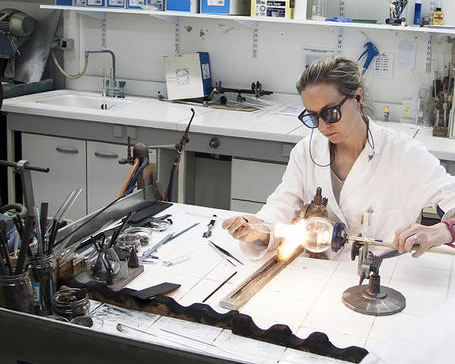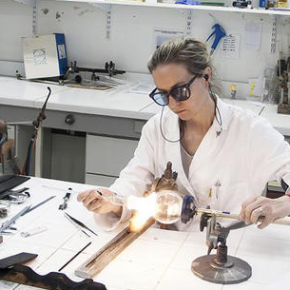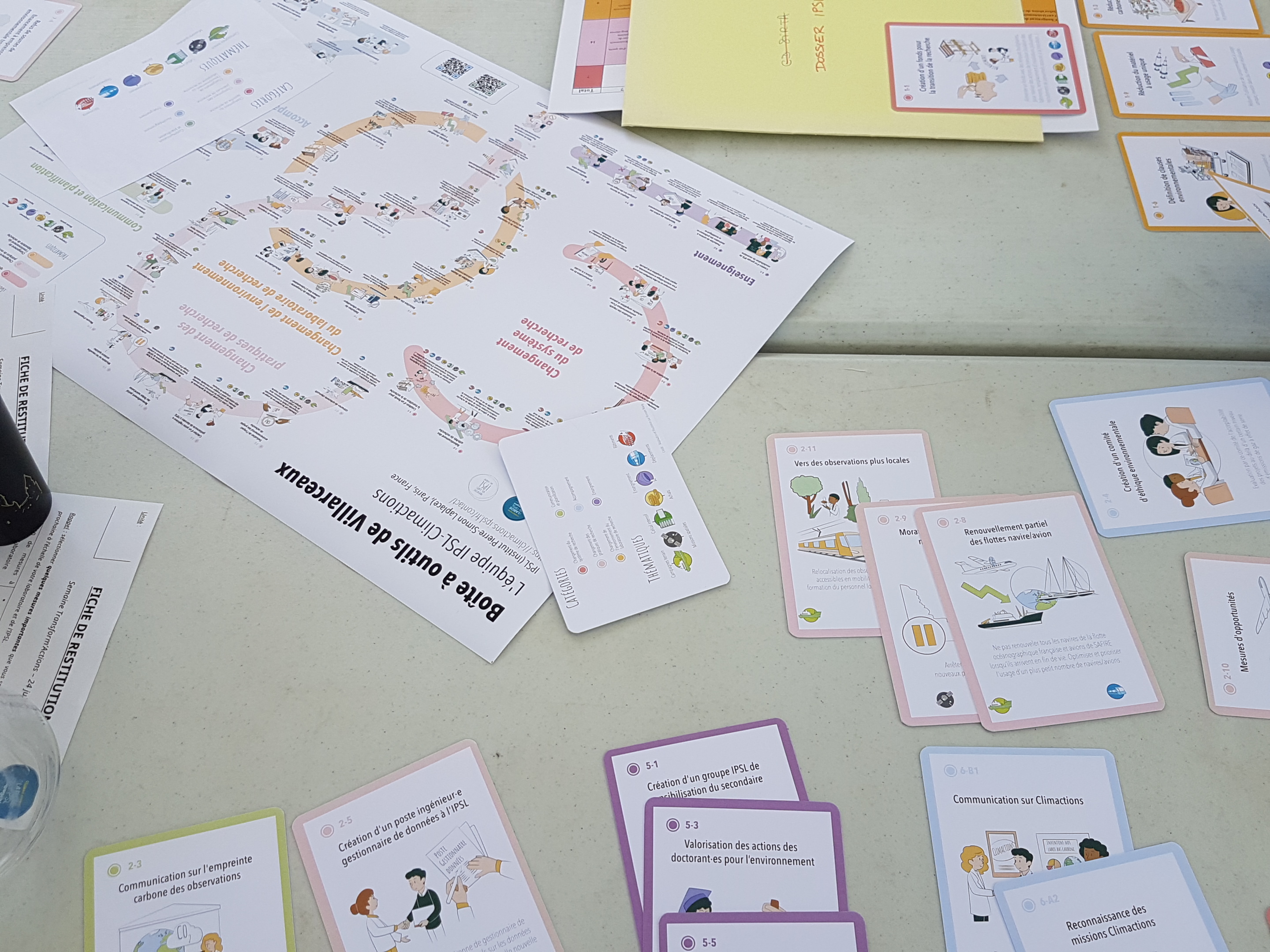The start of the environmental transformation of research professions
The environmental transition has already begun in scientific practices and now research careers and professions are also starting the same transition.
"I was 43 which made me older than most of the colleagues who hosted me for my end-of-studies internship". Stéphanie Boniface still laughs recalling this. Beyond this anecdote, this former aeronautical engineer's reconversion to a profession that is compatible with her values and commitment to the environment is revelatory of a broader fundamental movement. Stéphanie Boniface is now the French higher education and research environmental footprint officer for the Institut Pierre-Simon Laplace (IPSL) which coordinates climate science research in the Paris region. The environmental transition affecting all research professions remains marginal and is still far from representing a "Big Bang in research". However its effects can be seen in "readjustments within disciplines and shifts towards subjects that are both common and new to all involved" explains Olivier Leclerc, a CNRS research professor at the Centre for Legal Theory And Analysis (CTAD) and rapporteur for the CNRS Ethics Committee's (Comets) opinion 'Intégrer les enjeux environnementaux à la conduite de la recherche – Une responsabilité éthique' (Integrating environmental issues into the conduct of research - An ethical responsibility).
Both administrative and scientific profiles are involved in career changes of this sort but all derive from the same logic in which something clicked into place. Stéphanie Boniface's realisation dates back to September 2014 and her first climate march1 despite her not being particularly used to going on demonstrations. She explains her commitment as a "reaction to too much cognitive dissonance. My former profession was losing meaning just as I was becoming aware of the actions needed in favour of the transition". Following on from this she became involved with two anti-waste associations - Surfrider and Zero Waste - and, as she admits, this new commitment led to a form of growing distance from aeronautics - "I was much more motivated to speak about waste in schools than to work on my professional activities". This engineer was halfway through her career when she took leave for further training then she left her job to return to her studies, working towards a Master's degree in environmental studies. Following this, she worked on an internship at the town hall in the 10th arrondissement of Paris before going into research at the IPSL. André Estevez-Torres' scientific career change is very similar. This CNRS research professor with the Laboratoire avancé de spectroscopie pour les interactions, la réactivité et l'environnement2 recalls that "in 2018, there was a series of turning points for people in research - the publication of the IPCC's 1.5 report, Nicolas Hulot's resignation, young people's climate marches and in the actual research sphere the creation of the Labos 1point5 cross-disciplinary collective3 and Atécopol, the political ecology workshop in Toulouse4 ". This all led to the then biophysicist choosing "to make a change within myself now rather than be passively subjected to the inevitable change to come" and changing his focus to the emerging field of sustainability studies. He now heads the Labos 1point5 research network (GDR) and is more specifically working on measuring the carbon footprint of scientific purchasing which alone accounted for 74% of the CNRS's greenhouse gas emissions in 2019.
The emergence and resurgence of professions
New professions are also emerging alongside such examples of retraining and this is the case for Stéphanie Boniface who admits that her post at the IPSL "develops as we go along" and also for Carole Mainguy, the first transition officer at the CNRS's West Occitania regional office (one of the organisation's eighteen regional offices). This former communications officer already devoted 20% of her time to environmental issues but now has been given a full-time post doing so. Rather like Stéphanie Boniface, she admits that there are "legitimacy issues with such a very wide-ranging profession" covering everything from raising staff awareness to managing regional projects. Such initiatives include a new set of specifications for maintaining green spaces that follow the IPBES recommendations and also providing local support for environmental transition training for public sector staff. These aspects all need to be reconciled so West Occitania's transition officer's position is to "facilitate diplomacy" so as to "work on making subjects more acceptable that were often divisive and sometimes seen as just making people feel guilty."
Alongside these developments, other professions that were previously seen as in decline are now coming back into favour. At a time when laboratories are increasingly thinking about using glass instead of plastic, glassblowers could have a role to play in research's environmental transition. Cécile Valter, a glassblower with a twenty-year career at the CNRS's Rennes Institute of Chemical Sciences, notes that her "profession has completely taken off. We work more and more for several laboratories and get more and more work linked to the institute's growth because scientists appreciate our prices being 5 to 10 times less than those of the private sector and also the speed we work at". Her colleague Thierry Pain was awarded the CNRS Crystal Medal in 2020 and thinks similarly. "It's a profession that's going to last. So many young people are still signing up at the Lycée Technique Dorian - the only school that gives training in scientific glassblowing - and also there'll always be a demand." Another example came in 2022 when the European Centre for Research and Training in Glass Arts (CERFAV) in the East of France launched a CAP5 training course in scientific glassmaking for adults going through retraining.
Finally, other staff members have already integrated the environmental transition into their skill sets. Aurore Debono is a public procurement and purchasing techniques officer with the CNRS's Purchasing and Innovation Office (DDAI). She describes the context of her former job in purchasing. "Sustainable development in public procurement is not a new thing - as early as the 1990s, optional social and environmental criteria were included in French public procurement contracts. The result is that, thirty years on, the sixty or so buyers in our regional offices today do know about regulations like the (French) Climate and Resilience Law6 and now are keen to implement environmental clauses and criteria that are truly effective''. This pool of skilled regional purchasing officers has enabled the CNRS to successfully impose a dedicated environmental criterion for all formal procedures in its public procurement contracts since May 2023 - three years ahead of similar regulations for the whole French public sector.

Towards an institutional framework for individual transitions?
However, some professions and areas of research could undergo radical change alongside those that are emerging. Olivier Leclerc assumes that "certain research could be restricted or even banned because of its negative impact on the environment. An approach like this to environmental ethics would be similar to the approach used for bioethics". The Comets rapporteur cites the examples of research into geo-engineering or hydraulic fracturing techniques for oil production aimed at leaving fossil resources underground as the IPCC recommends. This brings up the question of how the environmental transition should be managed for research professions by scientific institutions. Until now, changes have been made at an individual level but "this policy of individuals volunteering necessarily slows down people's careers", regrets Camille Scalliet, a young CNRS researcher with the Physics Laboratory of the ENS7 . She was asking herself questions about air travel to the point that she turned down a week-long summer school in Brazil because others on site could replace her and advocates "frugal computer modelling with resources used sparingly and with prior planning to avoid running calculations for hours on end". Nevertheless she believes the main responsibility in this area lies with the employer, in her case the CNRS. She considers her organisation should "encourage changes in research practices by integrating environmental ethics like refusing to fly into the qualitative evaluation of research". Pending this kind of reform, the CNRS has decided to add a section listing conferences refused because of their environmental impact to the annual evaluation reports for its staff members. André Estevez-Torres shares her concerns, highlighting the fact that "the doctoral schools and single-discipline sections of the CNRS don't integrate careers in transition very well which leaves out a lot of people who could be supported and whose careers could risk coming to a dead end."
Because individual transition can come at a cost some cannot afford. All the people interviewed for this article were lucky enough to have a stable family and professional situation when their jobs changed. Carole Mainguy's experience as communications officer in the same regional office meant she "felt at ease changing jobs without plunging into the unknown as I benefited from experience in the field and was familiar with the structures of the organisation and its partners". For her part, Camille Scalliet recognises that "tenure at the CNRS has given me flexibility and enabled me to question research practices which a post-doctorate post does not offer". André Estevez-Torres openly admits he was "lucky enough to be paid to produce knowledge" and "started from a particularly privileged position - with an ERC Consolidator Grant8 and promotion to research professor - to move into a completely new field". He cites the "institutional legitimacy" the GDR he has since taken over gave him for his career transition. Based on his own personal experience, he observes that it is a good idea to "maintain a form of gradation between grassroots collectives and professionalising these activities as this means we can move gradually from associative issues in our spare time to scientific issues integrated into our work".
In the same way as the Labos 1point5 research network, a number of CNRS units are setting up gateways to support the transition or, at least, are integrating environmental issues into research professions. This is the case at CNRS Engineering, one of the organisation's ten Institutes, which set up a support and research unit (UAR) dedicated to life cycle assessment (LCA)9 in January 2025 along with a national training initiative10 on the same subject. Karam Sab, the scientific officer at CNRS Engineering, believes that "the environmental issue is indeed crucial in engineering sciences insofar as these interact directly with their industrial applications. Such concerns are so widespread the Institute had to create a synergy between them because no laboratory could effectively manage the issues alone". The Comets opinion on the subject inspired the creation of the new UAR which sees itself as a "two-stage rocket". Firstly, the scientific officer explains that, as the "brain behind a common methodology", the unit will need to develop new assessment methods "because currently LCA-type methods only apply to existing objects and not to potential fundamental research applications". Secondly the UAR will contribute to structuring the hitherto informal network of LCA engineers at the CNRS made up of between twenty and thirty people according to an internal survey run by the Institute.
The CNRS is gradually taking over the management of the institutional framework for the environmental transition of scientific careers without forcing its staff members to choose one profession rather than another. In this context, the CNRS is already anticipating the issue of the skills required for the environmental transition which it has integrated into discussions on its upcoming Objectives, Resources and Performance Contract. The stakes are considerable. As Olivier Leclerc reminds us, "we need to make sure the CNRS's low-carbon policy corresponds to the professional realities of research professions".
- 1Climate marches first appeared in the 2010s. These ecological demonstrations aim to encourage the public authorities to step up the fight against global warming.
- 2Advanced Spectroscopy Laboratory for Interactions, Reactivity and the Environment, CNRS / University of Lille.
- 3A cross-disciplinary collective of researchers from the French academic world who share the common goal of better understanding and reducing the environmental impact of scientific research activities, especially on the Earth’s climate.
- 4A multi-disciplinary collective of scientists from Toulouse that brings together researchers working on current and future ecological changes.
- 5Certificate of Professional Aptitude, a French secondary school and vocational diploma that gives a level 3 qualification as a skilled worker or employee in a particular trade.
- 6This Law will make it compulsory, as of August 22nd 2026, to include sustainable development criteria in public procurement contracts, particularly as regards the terms of technical or administrative performance conditions.
- 7CNRS / ENS - PSL / Sorbonne University / Université Paris-Cité.
- 8These grants from the European Research Council are worth up to €2 million and are awarded to European project leaders who obtained their PhD 7 to 12 years ago, the idea being to support the very best exploratory research in all scientific fields.
- 9This assessment method is designed to quantify a product or service's environmental impact with the aim of eco-design or to help choose the product or service with the best performance level among several. All the potential impacts on the environment and the consumption of resources are studied - from the extraction of raw materials to waste processing ("from cradle to grave"). This is a comprehensive, multi-stage, multi-criteria, standardised (ISO 14040-44) approach that has been recommended by the European Union.
- 10At the CNRS, a collective national training initiative (ANF for action nationale de formation) is one of the tools used to support the implementation of specific national policies or regulatory obligations, an emerging scientific field or technology and the development of professions and career paths. Such initiatives therefore respond to training requirements to help achieve one or more scientific and/or strategic objectives defined by the various CNRS Offices.

